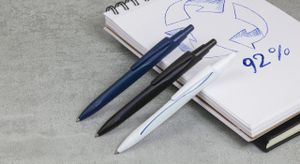Writing Utensils Stamps (DE-UZ 200)
Even in our digital age, everyday life at home, at school or at the office cannot be imagined without pens, pencils and other writing instruments. In 2011, a total of over 500 million pencils, 400 million pens and 550 million felt pens were produced in Germany alone. These instruments are counted among those everyday products that are manufactured in large quantities but have a rather short service life and therefore should be designed in the most resource-efficient way possible. Hence, the Blue Angel criteria require the use of resource-conserving materials, environmentally friendly packaging and the avoidance of hazardous ingredients. Another goal is to extend the life cycle of the products, for example, by means of refill systems.
Material selection contributes in a significant way to the conservation of resources. One way to conserve resources is the use of recycled paper, board or plastic materials. Here, preference should be given to recycled material from so-called post-consumer waste from private households, agriculture, trade and industry. Such post-consumer waste constitutes by far the greatest proportion of all waste. So far, however, only a small percentage of this material is recycled according to the type of material. Since, from the ecological point of view, high-quality recycling according to the type of material is usually superior to all other forms of recycling the demand for the corresponding post-consumer recycling materials should be supported. Another way of conserving resources is the use of materials based on renewable raw materials, such as wood or bioplastics. In order to make sure that the renewable raw materials used can make a contribution towards sustainable development these materials must come from certified sources.
-

Schneider Reco, Mine Eco 725
Schneider Schreibgeräte GmbH -
Benefits to the Environment
- ressource-conserving and environmentally friendly manufactoring process
- long lifespan
- low level of harmful materials
